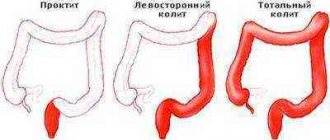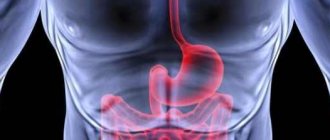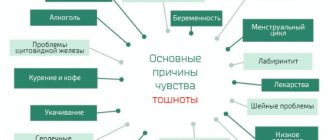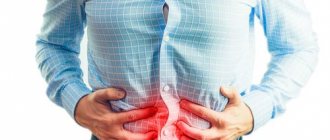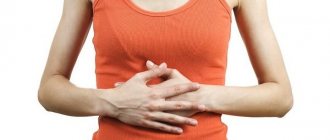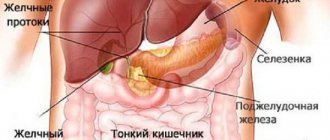Abdominal pain and fever in children
The child periodically complains of abdominal pain. The parent, if the stool is normal or there is one-time diarrhea, should understand that the baby has eaten unripe fruit or heavy, difficult-to-digest food. It is recommended to give medications that can relieve heaviness in the stomach. When a child has a stomach ache and fever, apathy, nausea, vomiting, diarrhea - this is the beginning of a chronic, acute disease, the presence of E. coli or helminths. In both cases, medication prescribed by a doctor is necessary.
First aid
Many people know that if abdominal pain occurs, you should not apply a warm heating pad, take painkillers, eat food or drink water. But what to do if your stomach hurts and your temperature rises. It is necessary to call an ambulance as soon as possible and wait for it in a state of complete rest.
You can get to the hospital on your own, but only with the obligatory accompaniment of someone. It is allowed to take medications that reduce body temperature. You can put ice on the area that is causing discomfort.
Infectious diseases
Poisoning – intoxication occurs when toxic toxins enter the body, causing digestive upset. There are: industrial, digestive, narcotic, alcoholic, suicidal and criminal poisonings. General symptoms: weakness, loss of appetite, diarrhea, vomiting and fever above 37C, and in case of acute intoxication - above 39C. Sometimes a headache is added. First aid: stopping the flow of toxic substances, taking enterosorbents and antipyretic drugs. During the first days, the patient is advised to follow a diet: oatmeal, mashed potatoes with water, crackers, and drinking plenty of fluids. After several days, when digestion is restored, you can gradually introduce homemade food. In case of severe and acute poisoning and no improvement, you should immediately call an ambulance.
Intestinal infections - the cause of infection is the entry of infectious agents into the body. From the oral cavity, microbes enter the gastrointestinal tract, and an incubation period begins, which lasts from six hours to two days. Intestinal infections manifest themselves in the form of acute diseases. An unpleasant consequence is chills, dehydration due to constant vomiting and bouts of diarrhea, intestinal damage, acute abdominal cramps. There may be a slight fever, depending on how long the person has been sick. These diseases are most severe in older people and children. In these cases, you should consult a doctor to determine the type of infection and begin treatment.
Salmonellosis – the causative agent of the infection is salmonella. It enters the human body through consumption of meat from an infected animal or poultry, causing inflammation of the gastrointestinal tract. The development of the incubation period lasts from twelve hours to three days. The patient vomits, foul-smelling and frequent loose stools, acute pain in the abdominal cavity, weakness. Breaks and twists the body, especially the limbs, an increase in temperature from 37.5C and above. This disease can only be detected through laboratory tests and tests. Salmonellosis causes a number of complications, so treatment must be carried out under the supervision of a doctor in a hospital.
Gastroenteritis – inflammation of the small intestine and stomach as a result of infection with calciviruses, rotaviruses or parasites. The complaints are similar to salmonellosis. It is recommended to treat intestinal gastroenteritis with medication. It is useful to drink strong, sweet tea, jelly, rosehip decoction and salt solutions (dissolve 2 tablespoons of sugar and 1 tablespoon of salt per 1 liter of boiled water). With prolonged and acute development of inflammation, treatment is carried out in the hospital.
Drug treatment
Treatment depends on the diagnosis made in the hospital. For various pathologies, the following groups of drugs can be prescribed:
- For gastritis and stomach ulcers caused by pathogenic bacteria, antibiotics are usually prescribed. In this case, Clarithromycin, Amoxicillin or Metronidazole are considered the most effective drugs. Proton pump inhibitors (Omeprazole) and bismuth-based medications (De-nol) are used.
- Food poisoning is treated by gastric lavage. Therapy necessarily includes taking sorbents, such as Enterosgel, Smecta, and activated carbon. In some cases, antibiotics are prescribed.
- If the patient has an infectious disease, antibiotic therapy is used.
- For stomach pain caused by stress, it is recommended to take a sedative. A tincture of lemon balm, mint, motherwort, peony, and valerian is suitable.
It is important to remember that when taking antimicrobial agents, you need to use probiotics, which normalize the intestinal microflora. These include drugs such as Laktovit, Linex, Hilak Forte, Bifidumbacterin and others.
To avoid intoxication and dehydration, rehydration therapy is necessary. Regidron is considered an effective drug.
To improve the digestive process, enzyme agents (Creon, Festal, Digestal or Mezim) are used.
Stomach pain can be relieved with antispasmodics and painkillers. A frequently prescribed drug in this case is No-Shpa.
In an adult, the temperature can be brought down with drugs based on paracetamol, ibuprofen, and metamizole sodium. Therefore, Meloxicam, Indomethacin, Cefekon, Voltaren, Paracetamol can be used.
Antipyretic syrups or rectal suppositories are recommended for children. You can lower your child's temperature with Paracetamol or Ibuprofen.
Experts say that for diseases of the digestive organs, it is better to use antipyretic suppositories, since they do not have a negative effect on the gastrointestinal tract.
In any case, the choice of medications for treatment should be made by a qualified physician. Self-medication can lead to aggravation of the situation and the development of severe complications.
For some pathologies (for example, appendicitis, polyps, cancer), surgical intervention is indicated.
In addition, an important component of therapy is dietary nutrition. In each case, the specialist selects a diet depending on the nature of the underlying disease and the individual characteristics of the patient’s body.
It is recommended for any pathologies of the digestive system to drink mineral waters.
Before selecting the appropriate treatment tactics, the doctor refers the patient for examination to determine the underlying cause of the pathological condition.
Non-communicable diseases
Appendicitis, peritonitis is one of the most common diseases of the digestive system in surgery. Associated with inflammation of the intestinal appendage called the cecum. The main symptom is pain in the umbilical region, moving to the right, lower part of the abdominal cavity. Appendicitis is treated exclusively with surgery. You need to seek help from a doctor as soon as possible, as there is a risk of developing serious complications. The most common is peritonitis. This is a serious illness that causes inflammation in the abdominal cavity. It is necessary to urgently perform an operation, otherwise severe intoxication of the body occurs, even death.
Chronic or acute gastritis is an inflammatory process of the gastric mucosa caused by various food irritants: poor diet and food allergies to medications. Acute gastritis provokes sharp pain in the stomach, heaviness, and nausea. With proper, timely treatment, the prognosis is favorable. If the patient does not seek help in time, the disease becomes chronic. You should follow a diet: exclude spicy, salty, hot foods, give up coffee, alcohol and smoking. A gastroenterologist will help you choose the appropriate diet and prescribe drug therapy.
Gastric ulcer is a chronic disease caused by a trophic disorder in the lining of the stomach. The stomach hurts, especially after physical exertion or when food irritants are ingested. Frequent attacks of heartburn, nausea, belching, stool disturbances, gas formation and fever appear. An ulcer is dangerous for the development of serious complications, so the patient is treated with medication and prescribed a diet that does not cause irritation to the gastrointestinal tract.
Cholecystitis is an inflammatory process of the gallbladder caused by difficulty in the outflow of bile due to complications of cholelithiasis. It is characterized by increasing pain in the right side, nausea, bitterness in the mouth, and high fever (over 38C). Stopping the flow of bile into the intestines causes yellowing of the skin and eyeballs, which is a prerequisite for jaundice. If symptoms are detected, rest, take antispasmodics, apply cold to the stomach and call an ambulance.
Nephritis is a kidney disease caused by inflammatory processes in tissues. Symptoms: bleeding in the urine, swelling, sharp pain in the lower abdomen and lower back, increased blood pressure and body temperature. If a disease is detected, the nephrologist prescribes a set of medications, depending on the type of disease and stage. In acute cases, treatment is carried out in a hospital.
Cancer of the digestive system is a serious disease caused by a malignant tumor in one of the digestive organs, most often the stomach and duodenum. The first symptoms are: indigestion, nausea, heartburn, foul-smelling belching, high fever, abdominal pain. With esophageal cancer - difficulty swallowing food, bleeding with sputum. To make a diagnosis, the patient is comprehensively examined. Treatment is performed surgically; if necessary, chemotherapy is prescribed to remove foci of the disease.
Helminths – popularly called worms, are parasitic worms. Common types are: trichuriasis, ascariasis, hookworm. A frequent case of entry into the body with dirty water or food in the form of larvae. Signs of infection are: weight loss, fever, severe stomach pain, swelling. The patient has asthenic syndrome and pale face. Parasites can be identified by taking stool and blood tests. For treatment, drug deworming of the body is carried out.
Ectopic pregnancy is a pathology caused by the implantation of a fertilized egg outside the uterus. Frequent symptoms: acute pain in the lower abdomen, aggravated by walking and sudden movements. Characterized by bloody discharge, weakness, and the temperature may rise. An ectopic pregnancy poses a serious threat to a woman’s health and life. Urgent surgery is required to remove the fetus. Delay can only make the condition worse.
Possible reasons
Diseases of the digestive system provoke the appearance of colic in the stomach. There are organic and functional disorders of this organ. Gastrointestinal pathologies causing spasms:
- gastritis;
- ulcerative lesions of the gastric mucosa;
- colitis;
- intestinal obstruction.
Additional functional reasons that provoke cramping pain in the stomach:
- side effects of medications;
- intoxications associated with food toxins or alcohol abuse;
- eating disorders;
- smoking;
- neuroses, stressful situations;
- coffee addiction
- allergic reactions to foods or other provoking factors, injuries to the stomach and intestines.
Necessary help for abdominal pain and fever
The temperature can rise for a number of reasons - this is a signal that there are problems in the body’s functioning. If there is a complaint of abdominal pain, it is worth finding out the cause of the disease. To do this, they visit a general practitioner, a gastroenterologist, and prescribe an ultrasound examination of the abdominal cavity and laboratory tests. After diagnosis, therapy is prescribed. Self-medication with folk remedies carries an increased risk of serious complications. In emergency cases, you should immediately call an ambulance.
What pathologies do stomach cramps indicate?
The nature of spasms differs in each specific case, as it depends on the course of the disease and the individual characteristics of the patient.
- Stomach ulcer - attacks almost never appear on an empty stomach; they occur more often after eating, after half an hour to an hour, and subside with the end of digestion of food.
- Pylorospasm - occurs in patients with a weakened nervous system, is characterized by attacks of vomiting and the appearance of a pain symptom after eating; after emptying the stomach, spasms and pain are not felt;
- Pancreatitis - pain during spasm radiates to the right hypochondrium or lower back;
- Dyskinesia of the gallbladder, cholecystitis - the appearance of painful spasms in the epigastric region after errors in nutrition (smoked, salty, fatty, overly sweet foods);
- Gastritis - severe spasms are accompanied by weight loss, vomiting, and sour belching.
- Acute intestinal obstruction - can be caused by a tumor, helminthic infestation, fecal conglomerate after constipation, accumulation of fiber, volvulus of intestinal loops. It is manifested by the inability to excrete gases and feces, bloating, painful spasms of the stomach and intestines, severe vomiting with bile and intestinal contents that acquire a putrid odor.
- Erosion of the gastric mucosa is characterized by prolonged, regularly occurring powerful spasms. The pain appears at night, and may be accompanied by bleeding, which indicates that the process has worsened and become chronic.
Reason for urgent hospitalization and prognosis for the development of the disease
In case of an “acute abdomen” that threatens the patient’s life, the prognosis for the development of the situation depends on how quickly the patient is taken to the hospital. Hospitalization is necessary for the following symptoms:
- Cramping pain changes its character and becomes diffuse and constant - suspicion of intestinal obstruction;
- An admixture of blood appears in the stool - suspicion of dysentery;
- The pain lasts for several days, constantly increasing, and is not relieved by antispasmodics;
- Vomiting appears mixed with blood, similar to coffee grounds;
- The stool turns black (“melena”), which indicates gastric or intestinal bleeding;
- Colic is accompanied by severe night pain, from which the patient wakes up;
- Paroxysmal pain occurs in a child, an elderly person, or a patient with a history of chronic diseases;
- Symptoms of colic in the stomach include dizziness, the appearance of delirium, and rapid pulse;
- After an abdominal injury, attacks of stomach cramps periodically appear;
- The patient shows signs of dehydration: the skin is dry and not elastic, the nose is pointed, the eyes are sunken, the urine is dark and there is little of it.
For most conditions that cause paroxysmal stomach pain, the prognosis is favorable. If the diet and nutrition regimen are followed, the health of such patients quickly returns to normal. Untimely diagnosed and treated diseases of the stomach and intestines can affect the condition of hair, nails, skin and teeth.
The consequences of stomach cramps can be the appearance of stomach erosion, atrophy of the gastric walls, ulcerative and oncological lesions of the stomach and intestines. To eliminate the possibility of developing severe pathologies, they should be examined in a timely manner and treated at an early stage.
source
Types of pain
Based on the type of pain, the doctor determines the possible cause of the pathology. Each disease is characterized by certain types of pain.
Acute
Severe stomach pain due to appendicitis. The pain is very intense, cutting, and intensifies with movement. Irradiation to the right side is typical. Associated symptoms are fever, abdominal pain and diarrhea.
Aching
During attacks of exacerbation of a peptic ulcer or gastritis, the patient feels a pulling, aching sensation in the abdomen, spreading to the entire abdominal region. In some cases, such symptoms are observed during overeating.
